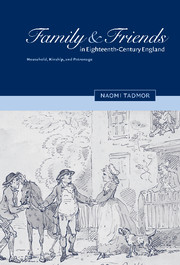Book contents
- Frontmatter
- Contents
- Acknowledgements
- A note on the text
- List of abbreviations
- Introduction
- 1 The concept of the household-family
- 2 The concept of the household-family in novels and conduct treatises
- 3 The concept of the lineage-family
- 4 The language of kinship
- 5 Friends
- 6 Political friends
- 7 Ideas about friendship and the constructions of friendship in literary texts
- Conclusion
- Bibliography
- Index
1 - The concept of the household-family
Published online by Cambridge University Press: 30 July 2009
- Frontmatter
- Contents
- Acknowledgements
- A note on the text
- List of abbreviations
- Introduction
- 1 The concept of the household-family
- 2 The concept of the household-family in novels and conduct treatises
- 3 The concept of the lineage-family
- 4 The language of kinship
- 5 Friends
- 6 Political friends
- 7 Ideas about friendship and the constructions of friendship in literary texts
- Conclusion
- Bibliography
- Index
Summary
Introduction
In seventeenth- and eighteenth-century England, we are told, the English family was characteristically nuclear. This depiction can be traced from the path-breaking studies of the Cambridge Population Group to the broad interpretative survey of Ralph Houlbrooke; from the aggregate analysis of parish registers to the individual testimony of Ralph Josselin's diary. Since the 1960s and 1970s it has become clear that the extended family household, what William Goode termed ‘the classical family of Western nostalgia’, was not the predominant household and family form in early modern England. English people in the early modern period did not have very large completed families, and did not live in large and complex households.
But what concepts of the family did people have in seventeenth- and eighteenth-century England? Did they focus exclusively on the nuclear unit as the prototype of household and family relationships, or were other concepts of the family significant in their world view? If we attend to the language people used, it seems that the latter was the case. Very often, when English people spoke or wrote about ‘families’, it was not the nuclear unit that they had in mind. ‘Family’ in their language could mean a household, including its diverse dependants, such as servants, apprentices, and co-resident relatives. Accordingly, Samuel Johnson defined ‘family’ as ‘those who live in the same house’.
The meaning of the term has been noticed by many scholars: indeed, it is mentioned in the opening pages of several studies of the history of the family.
- Type
- Chapter
- Information
- Family and Friends in Eighteenth-Century EnglandHousehold, Kinship and Patronage, pp. 18 - 43Publisher: Cambridge University PressPrint publication year: 2001



